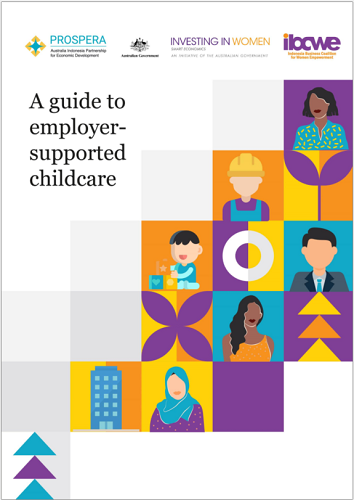A Guide to Employer-supported Childcare
Summary
Prevailing social norms often result in women facing disproportionate responsibility for child-rearing after childbirth, relative to men. This can impact women’s participation in the workforce, either through choosing self-employment or informal employment with flexible arrangements, or opting out of the workforce altogether. This guide aims to equip employers with innovative and actionable solutions to address the challenges of women’s dual roles at home and at work.
A Guide to Employer-supported Childcare was designed for employers who wish to establish or contract-out facilities, provide indirect support such as childcare allowance or subsidy, or complement support that would allow parents to care for children when the need arises. It’s also relevant for employers looking to deliver good-quality facilities, adhering to existing guidance and standards set by Indonesian law. This guide is relevant to diverse range of work sites, including office, factories, plantations, hotels, malls, and restaurants.
This guide was developed by the Indonesia Business Coalition for Women Empowerment, Investing in Women, and the Australia Indonesia Partnership for Economic Development. It was originally published in the IBCWE website.
Highlights
- The guide highlights four benefits of employer-supported childcare which are: improved employee engagement and productivity, expanded talent pool and attracting high performers, sustained top talent retention, and workplace diversity and reflection of commitment to positive work culture.
- It guides employers in providing childcare by 1) assessing the needs of employees, 2) assessing the company’s capacity, and 3) deciding on the level of support the company will provide.
- Further, it discusses the employers’ options for childcare support ranging from direct, indirect, to complementing support.
- It also shares good practices from leading companies that employers can learn from and adapt to their own setting and context.


